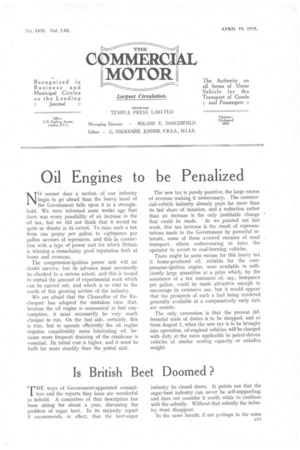Oil Engines to be Penalized
Page 23

If you've noticed an error in this article please click here to report it so we can fix it.
NO' sooner does a section of our industry begin to go ahead than the heavy hand of the Government falls upon it in a stranglehold. We were informed some weeks ago that there was every possibility of an increase in the oil tax, but we did not think that it would be quite so drastic in its extent. To raise such a tax from one penny per gallon to eightpence per gallon savours of repression, and this in connection with a type of power unit for which Britain is winning a remarkably good reputation both at home and overseas.
The compression-ignition power unit will no doubt survive, but its advance must necessarily be checked to a serious extent, and this is bound to curtail the amount of experimental work which can be carried out, and which is so vital to the needs of this growing section of the industry.
We are afraid that the Chancellor of the Exchequer has adopted the mistaken view that, because the oil engine is economical in fuel consumption, it must necessarily be very much cheaper to run. On the fuel side, certainly, this is true, but to operate efficiently the oil engine requires considerably more lubricating nil, because more frequent draining of the crankcase is essential. Its initial cost is higher, and it must be built far more sturdily than the petrol unit. The new tax is purely punitive, the large excess of revenue making it unnecessary. The commercial-vehicle industry already pays far more than its fair share of taxation, and a reduction rather than an increase is the only justifiable change that could be made. As we pointed out last week, this tax increase is the result of representations made to the Government by powerful interests, some of them avowed enemies of road transport, others endeavouring to force the operator to revert to coal-burning vehicles..
There might be some excuse for this heavy tax if home-produced oil, suitable for the compression-ignition engine, were available in sufficiently large quantities at a price which, by the assistance of a tax remission of, say, fourpence per gallon, could be made attractive enough to encourage its extensive use, but it would appear that the prospects of such •a fuel being rendered generally available at a comparatively early date are remote.
The only concession is that the present differential scale of duties is to be dropped, and as from August 1, when the new tax is to be brought into operation, oil-engined vehicles will be charged with duty at the rates applicable to petrol-driven vehicles of similar seating capacity or unladen weight.




















































































